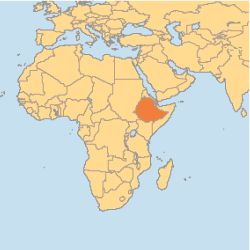David has moved to the wilderness of Engedi. Saul, momentarily diverted by Philistine raids on the land, pursues him once again with 3,000 choice men from all Israel. Providentially, Saul goes into a cave to relieve himself near the Crags of the Wild Goats.
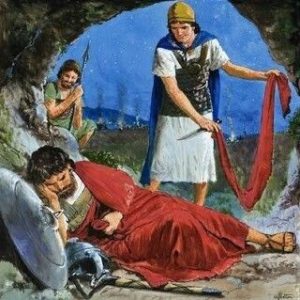 David sneaks up on Saul unnoticed and cuts off a corner of his robe. Afterward, his conscience convicts him. David’s men must have been bewildered that their leader let this opportunity to defeat his enemy slip away.
David sneaks up on Saul unnoticed and cuts off a corner of his robe. Afterward, his conscience convicts him. David’s men must have been bewildered that their leader let this opportunity to defeat his enemy slip away.
1 Samuel 24:6-7 So he said to his men, “Far be it from me because of the Lord that I should do this thing to my lord, the Lord’s anointed, to stretch out my hand against him, since he is the Lord’s anointed.” [7] David persuaded his men with these words and did not allow them to rise up against Saul. And Saul arose, left the cave, and went on his way.
We can see how David is keeping what is pleasing to the Lord in view. David respected God’s sovereign hand in establishing the rulers of Israel. He knew that God had permitted the office of the King and that Samuel had anointed Saul. David knew that he owed Saul reverence for his office’s sake.
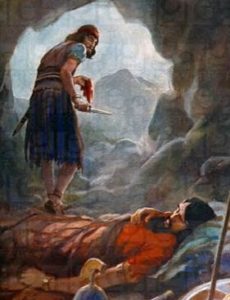 David’s pledge not to harm Saul was clearly vindicated in this incident. But the pledge not to touch the Lord’s anointed did not mean that whoever holds the anointed office is above criticism or rebuke when necessary. David publicly rebukes Saul for his wickedness in verses 8 to 15. (This shows that the command to ‘touch not my anointed and do my prophets no harm’ does not mean that they are beyond correction when there are Biblical mandates to do so.)
David’s pledge not to harm Saul was clearly vindicated in this incident. But the pledge not to touch the Lord’s anointed did not mean that whoever holds the anointed office is above criticism or rebuke when necessary. David publicly rebukes Saul for his wickedness in verses 8 to 15. (This shows that the command to ‘touch not my anointed and do my prophets no harm’ does not mean that they are beyond correction when there are Biblical mandates to do so.)
Both Jonathan and Saul noticed David’s resoluteness as a warrior. Both asked that David pledge that he would not destroy their households. (1 Samuel 24:21; 20:42)
David is being instructed by the Lord and shaped for his future reign. He appeals to the Lord to be the judge between himself and Saul.
1 Samuel 24:12 12 “May the LORD judge between you and me, and may the LORD avenge me on you; but my hand shall not be against you.”
Saul confesses that David is appointed by God as the future king of Israel.
1 Samuel 24:20 20 “Now, behold, I know that you will surely be king, and that the kingdom of Israel will be established in your hand.”
SAMUEL DIES AND IS BURIED IN RAMAH
David moves down to the wilderness of Paran. There he meets a very wealthy man from Maon named Nabal, who had property there near the village of Carmel. David treats Nabal’s shepherds with respect and hopes that they will show hospitality to his men, considering it was the time of the annual sheep-shearing festival and customary to do so.
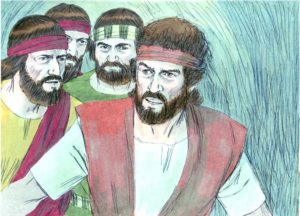 Nabal selfishly and stubbornly refuses to offer food and drink to David and his men. David reacts by telling his men to put on their swords and be ready for battle.
Nabal selfishly and stubbornly refuses to offer food and drink to David and his men. David reacts by telling his men to put on their swords and be ready for battle.
One of Nabal’s servants tells Nabal’s intelligent and beautiful wife, Abagail, what is happening (1 Sam 25:3). The servant lets Abagail know that David and his men meant no harm but in fact, showed them kindness and protected their shepherds and sheep during the sheep-shearing time.
Nabal’s servants know that Nabal is a wicked man that no one can talk to, and they hope that Abigail will intervene. (25:28)
Abigail is quick to do whatever she could to make peace. She provides ample food and drinks for David and his men without telling her husband, Nabal. She apologizes for her husband’s behavior, calling him a fool. (25:25)
 David’s vengeful nature resurges as he makes an inner vow to take revenge on Nabal for his insults and refusal to return their kindness.
David’s vengeful nature resurges as he makes an inner vow to take revenge on Nabal for his insults and refusal to return their kindness.
As Abigail is riding down a trail on her donkey, she meets David and humbly intercedes, pleading for mercy. She recognizes that David is God’s appointed leader for Israel.
1 Samuel 25:28-31 28 “Please forgive the transgression of your maidservant; for the LORD will certainly make for my lord an enduring house, because my lord is fighting the battles of the LORD, and evil will not be found in you all your days. 29 “Should anyone rise up to pursue you and to seek your life, then the life of my lord shall be bound in the bundle of the living with the LORD your God; but the lives of your enemies He will sling out as from the hollow of a sling. 30 And when the LORD does for my lord according to all the good that He has spoken concerning you, and appoints you ruler over Israel, 31 this will not cause grief or a troubled heart to my lord, both by having shed blood without cause and by my lord having avenged himself. When the LORD deals well with my lord, then remember your maidservant.”
Abigail, like Jonathan, helps David to do the right thing. She keeps David from avenging himself with his own hands.
This was all done without being noticed by Nabal, who was throwing a party at his home, eating, and drinking like a king. Abigail returns to find him drunk. She does not tell Nabal what she did to feed David and his men until the following day when Nabal has sobered up. When he hears what Abigail has done, he has a stroke and is paralyzed for about ten days, then dies.
When Nabal dies, it is without David having his blood on his hands. It would have been a different story if it had not been for Abigail’s intervention.
David then asks Abigail to be his wife. He also marries Ahinoam of Jezreel. Before officially being installed as king, David is already violating God’s command that kings do not multiply wives (Deut 17:17). King Saul forces his daughter, Michal, who had married David, to become the wife of Palti, the son of Laish, from Gallim.
While David trusted the Lord to fight his battles, he did not trust the Lord in providing a wife. Abigail provided David with God-honoring counsel. Yet David did not seek the Lord’s mind in the area of his relationship with the opposite sex. Just because a woman may be charming, intelligent, and able to give godly counsel does not mean that God’s clear word should be disregarded.
TODAY’S READING IN THE NEW TESTAMENT- JOHN 10:22-42
JESUS CLAIMS TO BE ONE WITH THE FATHER
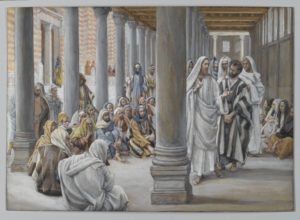 A new scene begins in John 10:22. It is the Feast of Dedication (‘Chanukah’ in Hebrew). This Feast was not one of the 7 feasts prescribed in the Book of Leviticus, but one instituted by Judas Maccabaeus about 165 BC on his purification of the temple after its defilement with idolatries by Antiochus Epiphanes. The feast is celebrated for eight days every year in the month of December (I Maccabees 4:52,59 in the Apocrypha).
A new scene begins in John 10:22. It is the Feast of Dedication (‘Chanukah’ in Hebrew). This Feast was not one of the 7 feasts prescribed in the Book of Leviticus, but one instituted by Judas Maccabaeus about 165 BC on his purification of the temple after its defilement with idolatries by Antiochus Epiphanes. The feast is celebrated for eight days every year in the month of December (I Maccabees 4:52,59 in the Apocrypha).
Jesus is in Jerusalem for the winter feast and the Jews gather around him, asking Him to plainly declare whether or not He is the Messiah.
Jesus reminded them that they have already been given His Word and His works as evidence.
He also affirms both His and His Father’s work in salvation. He and the Father are one.
When He affirms that His Words and works fit the bill, they want to stone Him for blasphemy.
Their intention from the start was not to believe but to kill. This is the natural state of our unregenerate hearts. The evidence can be plainly presented to us, and we suppress the truth in unrighteousness.
John 3:19 19 “This is the judgment, that the Light has come into the world, and men loved the darkness rather than the Light, for their deeds were evil.”
This chapter closes the first section of the Gospel of John that deals with the public ministry of Jesus. What follows will be an account of His private ministry and events that lead up to His crucifixion.
Jesus gives those who believe on Him great assurance of their eternal security.
 John 10:28-30 28 and I give eternal life to them, and they will never perish; and no one will snatch them out of My hand. 29 “My Father, who has given them to Me, is greater than all; and no one is able to snatch them out of the Father’s hand. 30 “I and the Father are one.”
John 10:28-30 28 and I give eternal life to them, and they will never perish; and no one will snatch them out of My hand. 29 “My Father, who has given them to Me, is greater than all; and no one is able to snatch them out of the Father’s hand. 30 “I and the Father are one.”
Upon hearing this, the Jewish leaders pick up stones to stone Him, accusing Him of blasphemy that he “a mere man” claims to be God. (10:33)
Jesus returns to the Jordan to where John had been baptizing in the early days. We learn that John never did a miraculous sign, and he was called the greatest born of women for many reasons, primarily because of his role as the Messiah’s forerunner (Matt. 11:11; John 10:41). Jesus performed the signs that signaled He was the Expected Messiah, and many believed on Him (10:42).
TODAY’S READING IN THE BOOK OF PSALMS- PSALM 116:1-19
All those born of the Holy Spirit can sing out the opening words of Psalm 116: “I love the Lord, for He heard my voice; he heard my cry of mercy.”
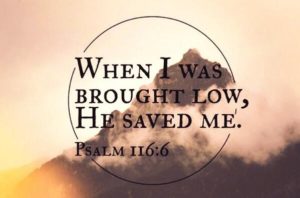 Have you cried out to the Lord for mercy like the publican in Luke 18:13? Look to Jesus and cry out: “Lord save me! (Psalm 116:4).
Have you cried out to the Lord for mercy like the publican in Luke 18:13? Look to Jesus and cry out: “Lord save me! (Psalm 116:4).
“Precious in the sight of the Lord is the death of His saints” (Psalm 116:15).
The gospel not only delivers us from death’s penalty but also the fear of death. Death for the believer is no longer a dreaded separation, but in the light of seeing the Lord face to face, a preferred choice. The Apostle Paul saw death as a gain, not a loss (Philippians 1:21), and a thoroughfare to the greatest blessing in the life of a believer. Paul said, “I prefer rather to be absent from the body and at home with the Lord” (2 Corinthians 5:8).
How important it is to gather with other believers to give God the praise and thanks that He is due!
Psalm 116:18-19 18 I shall pay my vows to the LORD, Oh may it be in the presence of all His people, 19 In the courts of the LORD’S house, In the midst of you, O Jerusalem. Praise the LORD!
TODAY’S READING IN THE BOOK OF PROVERBS
Proverbs 15:20-21 20 A wise son makes a father glad, but a foolish man despises his mother. 21 Folly is joy to him who lacks sense, But a man of understanding walks straight.
Parents have a responsibility to train their children to live God-honoring lives fit for the kingdom of God. They need to understand their life purpose and goal and set off in the right direction, seeking first to be right with God, born from above, and pursuing their eternal purpose.
PRAYER FOR THE NATIONS
Ethiopia
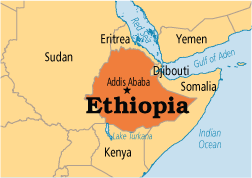 Federal Democratic Republic of Ethiopia
Federal Democratic Republic of Ethiopia
Africa
Geography
Fertile, mountain plateau surrounded by the drought-prone lowlands and deserts of the Red Sea coast, borders on Eritrea, Somalia, Kenya, and Sudan. Landlocked since the secession of Eritrea.
Population: 84,975,606 Annual Growth: 2.62%
Capital: Addis Ababa
Urbanites: 17.6%
HDI Rank: 171 of 182 (UN Human Development Reports 2009)
Peoples
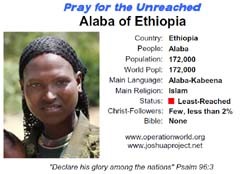 Peoples: 116 (17% unreached) All peoples
Peoples: 116 (17% unreached) All peoples
Unreached Peoples Prayer Card
Official language: Amharic; majority of the population are able to speak it; English widely taught. Regional languages are very important Languages: 88
Religion
Largest Religion: Christian
| Religion | Pop % | Ann Gr | |
| Christians | 51,563,198 | 60.68 | 2.7 |
| Evangelicals | 16,657,376 | 19.6 | 4.3 |
Challenges for Prayer
Massive growth in Protestant and Independent churches creates a great expectation for further harvest. Pray for:
a) Revival and growth to be sustained and for divisions and carnality to be avoided.
b) Effective means for generating income to support Kingdom workers, to develop the needed structures and facilities and to fund social programs that are essential in the prevailing conditions of deep poverty. The Church must minister as the poor to the poor; pray for creative solutions to the challenges this brings.
c) Continued unity and cooperation among leaders, qualities forged through past suffering. Relationships among denominations seem stronger than the divisions that occur within denominations; pray against the dividing influences of the enemy and human pride. Pray especially for the Evangelical Churches Fellowship (ECFE), which represents the majority of evangelicals in the country.
d) Missions vision was birthed out of suffering during the Marxist regime and the withdrawal of Western agencies during that time. Through ECFE, a long-term strategy for evangelizing Ethiopia has emerged, one that includes intercession, focus on unevangelized peoples, and church mobilization – only 3% of evangelical churches are regarded as being “mission-mobilized.” The vision entails planting, cross-culturally, thousands more churches in all regions of Ethiopia and even sending to the Horn of Africa and South Asia.
Foreign mission workers will never regain their pre-Marxist-revolution numbers or influence, but their role today is different. Lutheran and Pentecostal missions from the four Nordic nations have a long tradition of faithful service, as does SIM. The growing and maturing Church needs co-laborers and partners in areas such as training, Bible translation, reaching the last remaining unevangelized groups and especially in holistic ministry – health, agriculture, education, and community development. The largest agencies are: SIM, Norwegian Lutheran Mission, Swedish Pentecostal Mission, Word for the World.
PRAYER: Lord, we can say with the Psalmist, ‘We love you’. Thank you for hearing our heartfelt cry that You be merciful to us. We are sinners who cannot save ourselves. We need Jesus, and we believe that He is Who He says He Is- The Eternal Son of God, the only Savior, the Good Shepherd, who laid down His life for us when He took our place on the cross. We believe He bore the punishment our sin deserved so we could be treated by You the way He, who knew no sin, deserves to be treated. Such grace!
Help us to worship in the presence of Your people when we gather together to honor Your Name. We pray for the prosperity of Your church in Ethiopia. Lord of the harvest, send forth laborers into Your harvest and make us all effective and bold ambassadors for Your kingdom!
Pastor David

